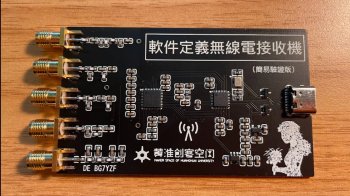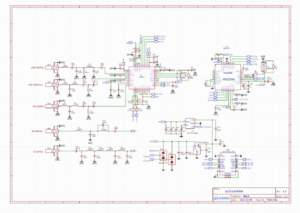Msi2500SDR: Difference between revisions
| Line 35: | Line 35: | ||
The thing that worked best for me, is the libmiri package by f4exb, together with SDR software sdrangel (also by f4exb) | The thing that worked best for me, is the libmiri package by f4exb, together with SDR software sdrangel (also by f4exb) | ||
=== Linux kernel driver === | |||
It appears that the MSI2500 SDR is not usable with the default Linux kernel driver. | |||
Not sure what the Linux kernel driver is actually any good for anyway. | |||
To uninstall it (and avoid automatically loading it), do the following: | |||
* remove the modules manually | |||
<pre> | |||
sudo modprobe -r msi2500 msi001 | |||
</pre> | |||
* create a file /etc/modprobe.d/blacklist-msi.conf | |||
* contents should be | |||
<pre> | |||
blacklist msi001 | |||
blacklist msi2500 | |||
</pre> | |||
=== Soapy SDR === | === Soapy SDR === | ||
| Line 75: | Line 91: | ||
Now it can also use soapy as an input, for example | Now it can also use soapy as an input, for example | ||
rtl_433 -d driver=miri -v | rtl_433 -d driver=miri -v | ||
=== libmiri + sdrangel === | === libmiri + sdrangel === | ||
Revision as of 12:18, 7 March 2023
| Project Msi2500SDR | |
|---|---|

| |
| Making an inexpensive MSI2500 software-defined-radio work on Linux | |
| Status | In progress |
| Contact | bertrik |
| Last Update | 2023-03-07 |
Introduction
This page is about an inexpensive SDR with MSI2500/MS101 chip, basically a chinese clone of the SDRPlay RSP1. It is in some places also referred to as BG7YZF.
Aliexpress link: https://nl.aliexpress.com/item/1005003654127606.html
On this page, I'm documenting how to get it to work effectively under Linux.
Hardware

This device has the following properties:
- 5 separate SMA inputs for 5 different frequency bands
- USB-C interface to computer (USB high speed?)
- Samples radio at up to 8 MHz (?) and 12-bits
- Has a stable and accurate oscillator (TCXO), compared to (for example) the rtl-sdr
Analysis of the board: https://github.com/EndlessEden/msiSDR/tree/RSP1-S
Software
Linux
This thing seems to be semi-supported by Linux:
- there are msi2500 and msi101 kernel drivers, generally it seems you should not use them
- supported by "soapysdr"
- supported by "gr-osmo"
- supported by "libmiri"
The thing that worked best for me, is the libmiri package by f4exb, together with SDR software sdrangel (also by f4exb)
Linux kernel driver
It appears that the MSI2500 SDR is not usable with the default Linux kernel driver. Not sure what the Linux kernel driver is actually any good for anyway.
To uninstall it (and avoid automatically loading it), do the following:
- remove the modules manually
sudo modprobe -r msi2500 msi001
- create a file /etc/modprobe.d/blacklist-msi.conf
- contents should be
blacklist msi001 blacklist msi2500
Soapy SDR
Still not completely sure what it does, read for example https://github.com/pothosware/SoapySDR/wiki
Support for the msi2500:
- install the soapy driver:
sudo apt install soapysdr-module-mirisdr
- try to find in SoapySDRUtil
SoapySDRUtil --find
should result in (for example):
Found device 3 driver = miri label = Mirics MSi2500 default (e.g. VTX3D card) miri = 0
- try to open with SoapySDRUtil
SoapySDRUtil --probe="driver=miri"
results in
Probe device driver=miri Using device #0: Mirics MSi2500 default (e.g. VTX3D card) usb_claim_interface error -6 Error probing device: Failed to open mirisdr device.
This can be 'fixed' by unloading and blacklisting the msi001 and msi2500 linux kernel drivers.
SoapyMiri driver
See https://github.com/ericek111/SoapyMiri
Works together with https://github.com/ericek111/libmirisdr-5
This is a driver for the soapy framework, identifies as "soapMiri" (TODO: check) instead of simply "miri" (in the driver described above).
rtl_433
This is a utility that was originally written to decode signals from devices like weather stations, typically operating in the 434 MHz ISM band, using an rtl-sdr.
Now it can also use soapy as an input, for example
rtl_433 -d driver=miri -v
libmiri + sdrangel
For me (bertrik), using Debian (bookworm/sid) the following gives a usable SDR setup to play with:
Build and install libmiri by f4exb:
git clone https://github.com/f4exb/libmirisdr-4 cd libmirisdr-4 mkdir build && cd build cmake .. nice make -j3 sudo make install
Build sdrangel by f4exb:
- install at least the following QT5 development packages (sudo apt install ...)
qtbase5-dev qtbase5-private-dev qtlocation5-dev qtmultimedia5-dev qtpositioning5-dev qtwebengine5-dev libqt5charts5-dev libqt5serialport5-dev libqt5texttospeech5-dev libqt5websockets5-dev
- other libraries
libserialdv-dev libboost-dev libfftw3-dev libopus-dev libhackrf-dev libiio-dev libopengl-dev libusb-1.0-0-dev
- get the source and build it
git clone https://github.com/f4exb/sdrangel.git cd sdrangel mkdir build && cd build cmake .. nice make -j3
Other packages
To be investigated: